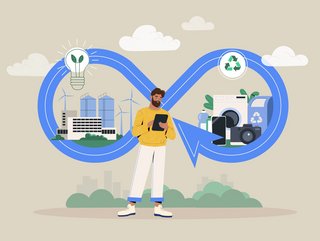The circular economy and how it can work for businesses

There is a lot of talk about the circular economy. If you’re really serious about making your business sustainable then you need to embrace the circular economy. No more forced obsolescence or cheap products that fall apart within weeks. Mending, reducing, reusing, recycling, these are all things we are meant to be striving for.
But in the world of business, where growth is paramount, what does a circular economy actually mean? How do businesses reduce their impact on the environment without severely reducing their bottom line? People might say that the planet is more important than profit, and it definitely is, but jobs are important too and without a healthy functioning economy, society crumbles.
Supply chains are already under massive strain post-pandemic and a financial crisis looms on the horizon. So, what is to be done? How can we reduce manufacturing waste without bankrupting businesses?
What is a circular economy?
A circular economy is a systemic approach to the control and reduction of waste within manufacturing and business. The idea is to design products that can be reused, reduced or in some way recycled once they are no longer fit for use. After which they can be in some way cannibalised back into production so the materials do not end up as waste.
The circular economy operates on three main principles, which include: creating manufacturing systems that no longer produce waste or pollution; choosing materials based on their reuse value rather than materials that have limited viability; and using power sources and materials that are renewable.
In practice this means, using clean manufacturing processes that do not release toxins or emissions into the environment; using materials that are durable and can be recycled after the productions initial shelf-life has ended; and using renewable power sources and bio-based materials, such as bamboo, that can be safely returned to the earth once no longer viable as a manufacturing material.
Why should your business embrace a circular economy?
There are lots of business benefits to changing from a linear to a circular economy, such as saving yourself and your clients money or retaining staff due to less ‘conscious quitting’, regardless of the environmental benefits.
A circular economy sounds more expensive and time consuming than the standard take-make-waste style of a linear economy, however, it is more beneficial in the long run as it respects the fact that resources on earth are finite.
Global waste is a huge problem. Millions of tonnes of waste from fast fashion and technology are dumped every year, and not only is it bad for people and the environment, but it is also a shameful squandering of available resources.
There has long been a problem of richer countries dumping their waste into poorer countries, like the abominable dumping of e-waste into Africa, but what is even worse is that these materials could have been reused. A fact that has become even more apparent when put in the context of materials shortages, that are putting other environmental solutions, like electric vehicles, at risk.
Products are still being manufactured for waste, when reusing and recycling could easily be designed into their lifecycle with some forethought. Saving manufacturers and businesses money and time through retrieval of resources. A business controlling its waste cycle is actually a business taking control of its supply chain and reducing competition on the same resources.
Even if reusing materials for the original product isn’t viable due to safety concerns, there are ways that waste can be reborn into other forms like furniture or clothing, creating new revenue streams for businesses. Selling by-products is already a common business practice, in a process that is known as by-product synergy, through which hundreds of other industries flourish.
Circular economy is no different, businesses just need to be creative about how to manufacture and monetise their waste. Not only will it be good for businesses, but the environment will be happier too.






